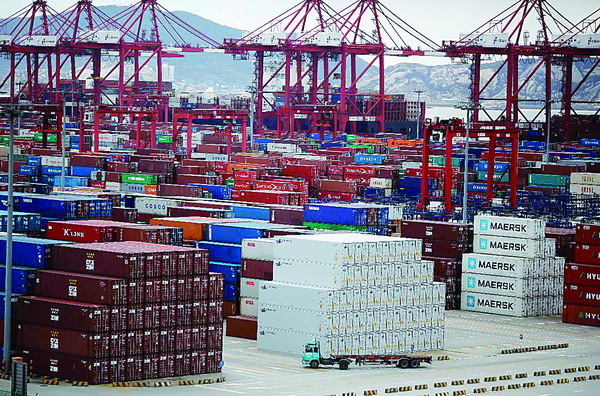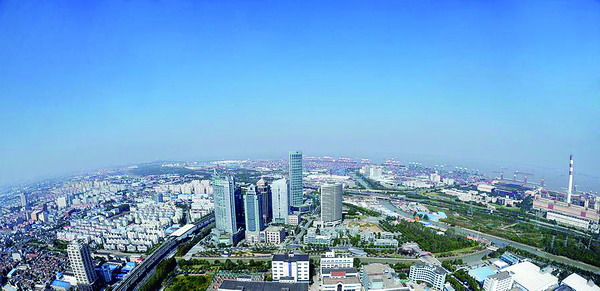China is redoubling its efforts to establish a nationwide logistics network by launching logistics projects in different regions.
 |
|
A container truck drives past the container area at the Yangshan Deep Water Port, part of the Shanghai Free Trade Zone. PHOTO BY REUTERS |
“The strategy is to provide a platform for a region where different cities are linked to each other to enjoy the same logistics service,” said a local logistics expert. “It is a firm effort the country has taken to stimulate regional economic development.”
Tianjin has led the nation to set up an aviation logistics park at its airport economic zone with a logistics company unveiled early August.
“The event aims to turn the park into the most convenient aviation logistics integrated platform in North China,” said Zhao Shengyue, general manager of the Tianjin Aviation Logistics Development Co Ltd, adding that the platform will be used to serve the economic development of Beijing, Tianjin and Hebei province.
“We will make full use of the resources of Beijing and Tianjin to help handle the cargoes from Capital Airport in Beijing. Doing so will also sharpen the competitive edge of Tianjin’s aviation logistics industry,” Zhao said.
The company, funded by the Tianjin Bonded Area Investment Holding Group Co Ltd, the Hainan Airlines Group Tianjin Aviation Ltd Co and the Capital Airport Group will be responsible for promoting Tianjin’s aviation logistics market and integrating its resources in this field.
At present, many famous logistics enterprises, including Sinotrans, Hainan Airlines Logistics, COSCO Air and SF-Express, have set foot in the Tianjin Airport Economic Zone.
“The park, which is close to aprons and freight warehouses, is very convenient to logistics enterprises which can save costs and time,” said Yang Hongwei, general manager of the Sinotrans Air Transportation Tianjin Branch. Meanwhile, a large logistics project has been launched in Nanchong, Sichuan province to establish a large-scale and modern logistics park in northeastern Sichuan.
The park, covering an area of 12.9 square kilometers, costs 12 billion yuan ($1.95 billion) in investment and is expected to be completed by 2017.
The State-level logistics park, which can easily be accessed by highways, consists of a bonded logistics center, logistics areas for building materials, agricultural and industrial products, and a grain warehouse area. On completion, it will be able to deal with 80 million tons of cargo annually and will create 100 billion yuan ($16.3 billion) in business transactions and 2 billion yuan ($325 million) in tax.
“It has been considered as a key project to promote the province’s economic development,” said Wei Hong, governor of Sichuan province. The park, to date, has attracted investment of 2.64 billion yuan.
The Fresenius Kabi group from Germany, one of the world’s top 500 companies, has also invested 30 million yuan in the Nanchang Economic Development Zone to build an Asia-Pacific logistics center, which is expected to become its largest logistics base in the Asia-Pacific region.
In Henan province, the provincial government plans to turn Shangqiu into a regional logistics city to serve four provinces nearby.
“We will build a modern market system to step up the development of the local logistics industry,” said Tao Minglun, Party secretary of Shangqiu.
He said efforts will be made to develop logistics industrial clusters to create sales of 100 billion yuan annually, which will be served by a logistics distribution system.
“We try to generate an output value of 400 billion yuan in logistics by 2020, becoming one of the city’s six pillar industries,” Tao said.
Priority given to logistics parks
China now has 754 logistics parks, up 58.7 percent over 2008, with a majority dotted in economic zones along the middle reaches of the Yangtze River, according to a survey made by the China Federation of Logistics and Purchasing and the Chinese Logistics Society.
Statistics which were released by the federation in May 2014 showed that 128 logistics parks are located in the northern coastal economic zones, 98 in southwest economic zones, 93 along the middle reaches of the Yellow River, 93 in eastern coastal economic zones, 84 in southern coastal economic zones, 63 in northwest economic zones and 56 in northeast economic zones.
The survey showed that logistics parks at the northern coastal areas are developing faster than other coastal areas, while more logistics parks are emerging in western regions.
“It indicates that local governments have given priority to developing logistics parks, because they have considered them as a strong stimulus to local economic growth,” said He Dengcai, vice president of the federation, adding that some cities have adjusted their planning for logistics parks and some integrated small-scale and scattered parks into large-scale ones.
Statistics also showed that 45 percent of the parks surveyed created annual taxes of 10 million yuan, in which parks contributing to taxes of more than 100 million yuan accounted for 21 percent.
“We have also seen that foreign investors are paying more attention to logistics parks and are willing to invest in them,” he said.
He predicted that urbanization will help create new demand for logistics, stimulate the growth of logistics parks and make them improve service.
“The fact that more farmers will enter into towns and small and medium-sized cities will surely step up the process of urbanization and also call for more logistics services,” he said. “Therefore, professional services will be called for to meet their needs.”
 |
| A bird’s-eye view of the Shanghai Waigaoqiao Bonded Zone. PHOTO BY XINHUA |
International logistics
According to the federation, inland cities, such as Xi’an in Shaanxi province, are developing international logistics although they have no sea ports.
“They use highways, railways and airports to develop international logistics,” He said.
He concluded that logistics parks will face new development opportunities thanks to urbanization, but they will also meet new challenges which will require them to improve services.
“Efforts will be made to upgrade their intensive operation levels, perfect their urban logistics functions, reduce costs and increase efficiency to adapt to the industrial structure adjustment and economic development,” he said. Meanwhile, work will be done to optimize layouts to build a number of model parks, he said.
The country’s strategy, he said, is to promote the development of logistics parks which rely on highways to transport cargoes.
“An information system should be established to serve these parks by reducing idling vehicles, shortening distribution time, cutting down logistics costs and improving efficiency,” said a report from the federation. Insiders said a highway and information network will connect related logistics enterprises to form a chain operation system.
The report said in the next three to five years, the country will place focus on developing trade-oriented logistics parks as part of its effort to reform its distribution system.
One of the most important tasks for the near future is to develop international logistics bases in inland cities, which will be connected by railways and highways to coastal outlets, the report said.
“These bases will become bridgeheads in inland cities to provide convenient international logistics services for enterprises,” he said. “Our purpose is to give a seamless connection to inland international logistics parks.”
